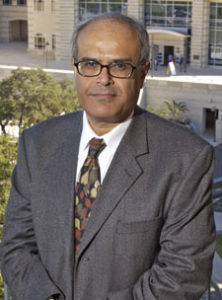Posted on September 27, 2018 by Joanna Carver
 The article, “A Model of Smuggling and Trafficking of Illegal Immigrants with a Host Country Policy,” appeared in the Review of Development Economics.
The article, “A Model of Smuggling and Trafficking of Illegal Immigrants with a Host Country Policy,” appeared in the Review of Development Economics.
The staggering volume of unauthorized immigrants has motivated many influential studies in economics, political science, sociology and international law.
“It is a fascinating, contemporary topic,” said Beladi. “Relatively, the United States is in a much better position regarding unauthorized immigrants than European countries.”
The most recent data from 2014 estimates that there are 12.1 million unauthorized immigrants in the country—about 3.5 percent of the total United States population.
Beladi’s research particularly looked at how smuggling and trafficking could be curbed through the use of economic disincentives
“Policies to restrict unauthorized immigrants have been primarily driven by the political and economic judgments at the destination—capturing only a partial demand-side view of the problem,” said Beladi. “One has to nevertheless appreciate the fact that since immigration is principally governed by the conditions of excess supply of relatively unskilled workers, the socio-economic factors at the source must also be reviewed at length.”
The United Nations Office of Drugs and Crime states that the smuggling of workers is the fastest-growing activity in the world with profits currently estimated at $31.6 billion.
“Unless sufficient attention is devoted to crucial incentives and disincentives governing decisions to migrate illegally from the source countries, many restrictive policies designed at the destinations are not likely to yield adequate results or lessen the degree of exploitation that is intrinsic to unauthorized immigrants labor mobility,” said Beladi.
The first part of their model proposes taxing workers to fund enhanced unemployment benefits to protect legal unskilled workers, who are most susceptible to losing jobs due to unauthorized immigrants. The second strategy is to fine employers who hire unauthorized workers.
“The higher unemployment benefit and the higher penalty create dual pressure on the employers of unauthorized workers,” said Beladi. “As a result, they would need to lower the wages they pay to unauthorized workers—weakening the economic incentives of coming to the U.S. for both the immigrants and the smugglers and traffickers.”
Beladi is continuing his research in this area as well as looking at migration and trade issues in Europe.

